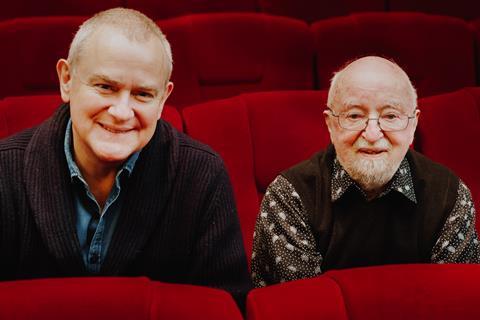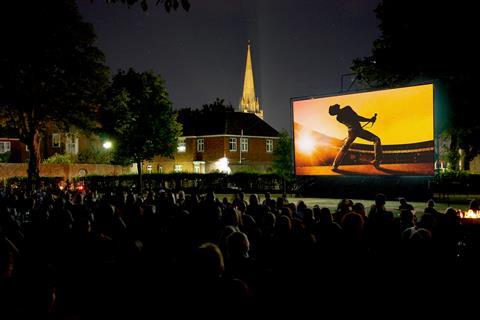
Aged 85, Roger Gibson is preparing for his final edition as artistic director of the Chichester International Film Festival (CIFF, August 4-27). He has built it into one of the UK’s leading regional film festivals since launching it in 1992.
Over the years guests travelling to the south of England festival have included Alec Guinness, Stephen Poliakoff, Kathleen Turner, Ken Russell, Mike Leigh and Ralph Fiennes. This year’s guest list is equally impressive: the festival has programmed retrospectives of work by Cate Blanchett and Hugh Bonneville, and both actors are set to attend, strike-willing.
Some 130 screenings will take place at this year’s festival, which is opened by producer Andrew Eaton and the UK premiere of Petr Vaclav’s Il Boemo about the life and career of the Czech composer Josef Mysliveček. “Opera does very well here – I thought this would definitely appeal to a Chichester audience,” says Gibson.
The films, many of them UK premieres, will screen at the 110-seat independent Chichester Cinema at New Park created by Gibson. There are also open-air screenings in Priory Park and silent film screenings accompanied by live music at guest venues including St John’s Chapel and the Guildhall in Chichester.
Growing the festival
The roots of both the cinema and the festival date back to 1979 when Gibson taught art and film studies at Chichester College. After the town’s only cinema closed, Gibson launched the Chichester College Adult Education Film Society showing films on 16mm one evening a week (the first was Woody Allen’s Love And Death). It quickly grew a loyal and cult following locally.
Gibson then spearheaded the launch of Chichester Cinema at New Park in 1984, created within a local community centre. In 1992, the film festival itself launched, offering a programme of 29 films.
Ahead of his final edition, Screen caught up with Gibson earlier this month at the Karlovy Vary Film Festival. It’s one of several European festivals – including Berlin, Cannes and Venice – that Gibson attends each year to scout for films to play at Chichester.
It’s quickly evident Gibson has a deep passion for film: at Karlovy Vary, he was in and out of screenings and was early to express his admiration for the eventual winning title at the festival, Blaga’s Lessons.
At the major festivals he won’t just confine himself to scouting for titles playing in official selection, he will also scout for hidden gems in the festival’s markets (“I always use Screen’s magazines at the festivals to find out information about the market screenings every day,” confides Gibson).
Asked how he has managed to build and grow the Chichester Film Festival and navigate it through challenges such as the pandemic and the rise of streaming, Gibson says it’s about “determination, stubbornness and enthusiasm”.

The festival itself is supported by a grant from the BFI and “lots of patrons” who each select a film to sponsor at the festival for around £200-300.
Still, Gibson says the economics of running a festival are challenging. In recent years, he has sought to programme more international films. “The only trouble is that they are so expensive. I feel like a second-hand car salesman [haggling with sales agents]. They say £1,000 and I say £300, and sometimes they agree.”
During negotiations, he stresses that Chichester Cinema has 110 seats so paying any more doesn’t make financial sense.
Another big challenge is the timing of the festival. Many distributors of UK films will hold out to see if they can secure a berth at the BFI London Film Festival which runs in October. “It’s a big problem. [The BFI] often says they are interested in a film, but they’re not. I suppose it’s the name of the game, but I wish they wouldn’t sit on them.”
Adding to the problems this year is Edinburgh International Film Festival’s move “into the middle of our festival”. Edinburgh now runs from August 18-23, overlapping with Chichester’s run. “It’s quite a problem,” admits Gibson.
UK premieres
Still, Gibson reckons Chichester has more premieres this year than ever before. A swathe of international films are debuting at the festival. They include Kirill Serebrennikov’s Tchaikovsky’s Wife from Russia, Dieter Berner’s Alma & Oskar from Austria as well as Declan Recks’ Irish-language Tarrac.
UK films premiering at Chichester include Franc Vissers and Elisabeth Healey’s documentary I’m Still Here, about homelessness during the pandemic, which has Elizabeth McGovern as an executive producer. All three will take part in a Q&A at Chichester about the film. Matt Winn’s black comedy The Trouble With Jessica and Paul Robinson directed And Then Come the Nightjars also have their UK premieres at Chichester.
Meanwhile, retrospectives are being dedicated to Jean-Luc Godard, Lindsay Anderson and the 150th anniversary of Russian composer Sergei Rachmaninoff.
On reflection
Asked for his thoughts on retiring, Gibson says he has mixed feelings. “In some ways, I’m relieved as I just find it such a responsibility. In January, I’ve got a blank page, because I tend to do virtually everything – not only do I select the films, I write about them and negotiate for them…I feel the stress as well as the buzz.”
His advice for programmers wanting to build a film festival is straightforward: “You’ve got to have enthusiasm.” He speaks of the importance of building relationships with distributors. “Most of the smaller UK distributors, I get on with very well and try and get as many of their films as possible, if they’re not keeping them for the LFF.”
Creating a festival is not without its challenges though: “People are not going to give you a film if they don’t think it’s going to be worth their while. It’s a chicken-and-egg situation. You have to build up the festival to get a reputation to get more films. Or if you’ve got plenty of money, then you just get them from abroad and pay silly prices!”
Gibson says that audiences “are slowly” coming back to cinemas after the pandemic. In his view, though, the industry is not making enough of what he calls “middle-of-the-road films” – those that sit between Marvel movies and pure festival films – that appeal to audiences at Chichester whose audiences tend to be older than most.
Among his highlights at Chichester have been hosting Alec Guiness. “He was a real charmer. He was very modest, but when he started speaking he really came out of his shell.” One of his toughest moments was hosting Kathleen Turner for what turned out to be a half-empty screening of War Of The Roses. Despite this, “she was terrific” about it, says Gibson.
For his final festival, Gibson has picked 10 of his own favourite films. Among them are Michael Powell and Emeric Pressburger’s A Matter Of Life And Death, Jacques Tati’s Jour De Fete, Sam Peckinpah’s The Wild Bunch and George Sluizer’s The Vanishing.
Although he is retiring from CIFF, Gibson isn’t ready to quit the business and will continue to run event cinema at Chichester for screenings of opera, theatre and ballet. He will also look after special events, such as the French Film Festival on tour, and continue to visit the likes of Cannes, Berlin, Venice and Karlovy Vary. “I will still go to all the festivals, but at least I won’t have any of the responsibilities.”
The festival has yet to reveal who will take over from Gibson for the 2024 edition.






![The Brightest SunScreen[Courtesy HKIFF]](https://d1nslcd7m2225b.cloudfront.net/Pictures/274x183/3/5/0/1448350_thebrightestsunscreencourtesyhkiff_312678.jpg)


















No comments yet